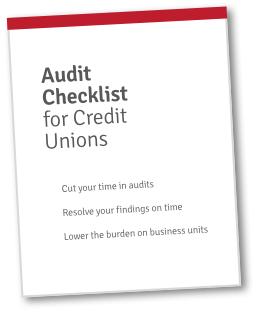Having a sound audit process isn’t easy. Fortunately—or perhaps, unfortunately—most credit unions are well acquainted with audits. Consequently, they tend to be quite good at the whole thing.
Nevertheless, there are some areas where credit unions should take extra care. Very often, an audit feels like it’s finished when you finally submit documents. That’s not exactly the case though, is it? Sometimes, audits last a good while past document submission. Some audit risks concern your access to information during all stages of the audit process—even after it’s “finished!”
With that in mind, we thought we’d put together a few tips to help you avoid some common credit union audit risks. We’ve seen these issues bug even the best credit union audit teams!
So, without further ado…
1. Information-Based Credit Union Audit Risks
One of the most important risks to avoid is with how you handle your information. Before you’ve even submitted your final documents, you’ll need to pay close attention to all the information available regarding your audit.
Vet all the information you get and provide. Make sure that the information you collected is the right information. Make sure that it’s reviewed and approved.
While this will be especially helpful during the finding and remediation processes, but you need to have all your information reviewed and approved before then.
Another critical aspect of information is storage, filing, or archiving it well. Make sure you can access and retrieve that information! If someone asks you a year or two down the line, “why did you answer this question this way?” You’ll want to be able to find your answer, review it, and make sure you went through the right process to get it.
2. Remediation-Based Credit Union Audit Risks
One thing that we hear a lot of credit unions run into is a relaxed attitude through the remediation process. After you’ve delivered your documents, your auditors may ask for you to change some things.
One of the common credit union audit risks with remediation is not taking it as seriously as the collection and answering phase. Things start slipping through the cracks. Sometimes, dates slip through. Other times, some business units will take more and more time to respond.
The best thing to do here is to stay on top of everyone! Make sure you have a system that keeps everyone present and accountable.
3. Time-Based Credit Union Audit Risks
The sad truth of audits is that they always take more time than you want them to. Well, that goes for everyone but those wild few who really love audits.
But one question you might find yourself asking is, “how much time is this audit taking?”
We understand—sometimes a week will feel like a month. But it’s not always time dilation! Sometimes you’re actually just moving too slow!
One of the biggest credit union audit risks is keeping up with the deadlines imposed by regulators and auditors. It’s extremely important to keep timely processes for collection, review, and approval. From the beginning to the end—even through findings and remediations—you must stick to the schedule.

FREE: Audit Checklist for Credit Unions
4 key principles and 9 questions to jumpstart your audit planning. From leading credit unions.Avoiding Credit Union Audit Risks
There are a few ways that credit unions can avoid the risks outlined above. One of the best and easiest ways is to bring in credit union audit software to help with the process. However, it’s not entirely necessary. Plenty can be done to speed you through your audit with minimal risk.
Still, if you’d like to see what audit software can do, one credit union cut 25% off their total audit completion times.
If you’d like to see other helpful tips and tricks for getting through audits unscathed, subscribe to our blog. Or if you’re more of a choose-your-own-adventure type, follow the links below!
HOW THE NCUA AIRES QUESTIONNAIRES CAN HELP YOUR CREDIT UNION PREPARE FOR YOUR NEXT REGULATORY EXAMINATION
TIPS FOR CREDIT UNION CEOS PREPARING FOR A REGULATORY EXAMINATION





